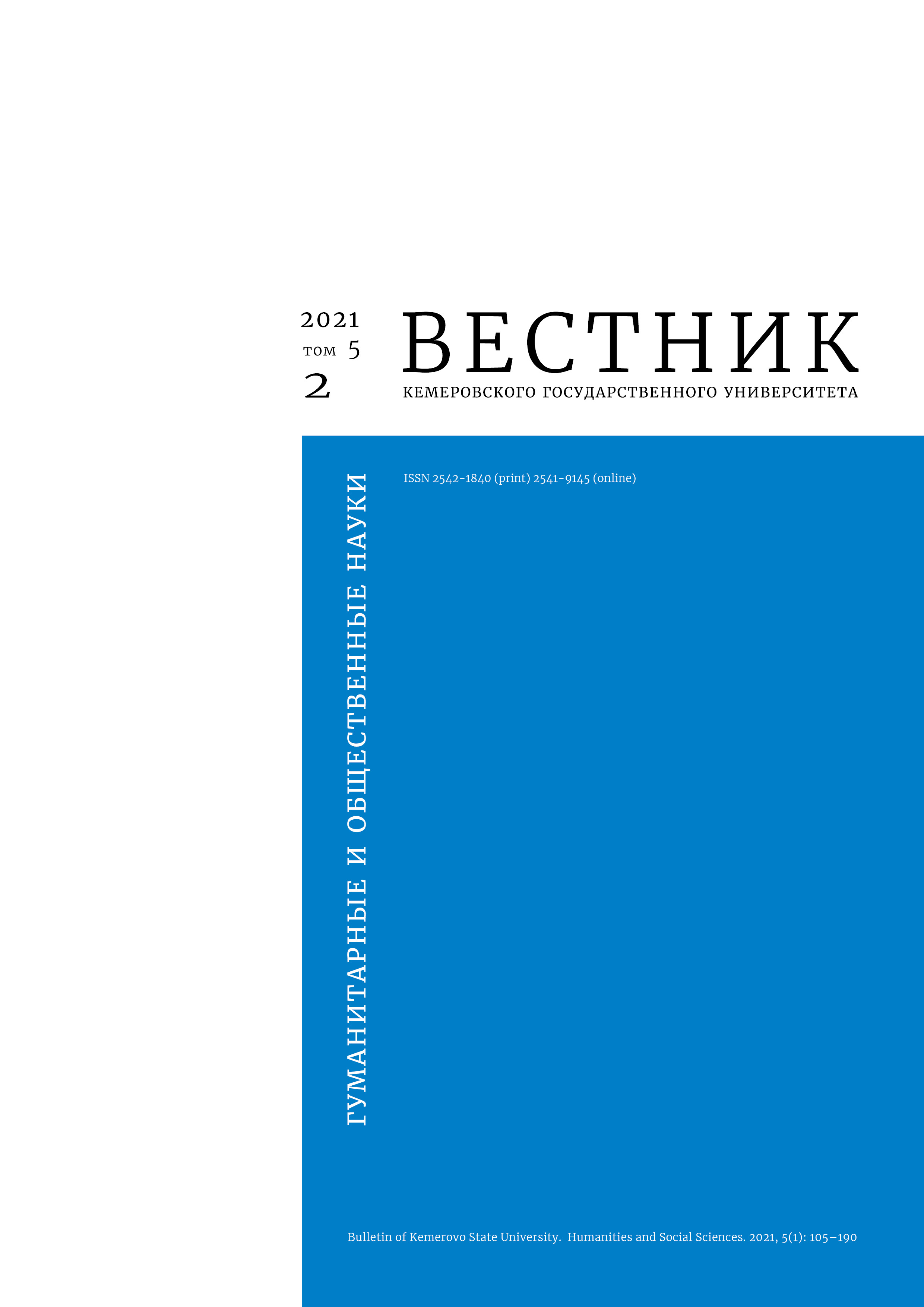Izhevsk, Russian Federation
The article addresses the problem of social health as a basic factor of positive sociocultural environment in the context of globalization. The research objective was to define the content of social health as a balance of such categories as social immunity and social pressure. The study relied on the methodology of philosophical analysis, dialectical method, and system approach. The phenomenon of social health was described as part of the system of dynamic and multidimensional social relations. The article featured the role of sociocultural environment of one's life and attitudes of spiritual and moral nature that make up one's social health formation. Social pressure is an attributive characteristic of social life, which is getting increasingly complex in all areas of human life. The article also introduces the term of social immunity as a set of spiritual foundations of one's activity that provides one with productive social relationships. Social immunity depends on one's age, lifestyle, and sociocultural environment. The author also analyzed various prosocial deviant forms of behavior. The decisive factor of social health formation is that social immunity should correspond with the current social pressure.
sociocultural environment, social interaction, healthy society, antisocial behavior, prosocial behavior, personal well-being
1. Oldenburg B., Cocker F., Schüz B. Public health as social science. International Encyclopedia of the Social & Behavioral Sciences, ed. Wright J. D., 2nd ed. Amsterdam: Elsevier, 2015, 545-551. DOI:https://doi.org/10.1016/B978-0-08-097086-8.14035-8
2. Cutrín O., Gómez-Fraguela J. A., Maneiro L., Sobral J. Effects of parenting practices through deviant peers on nonviolent and violent antisocial behaviours in middle- and late-adolescence. The European Journal of Psychology Applied to Legal Context, 2017, 9(2): 75-82. DOI:https://doi.org/10.1016/j.ejpal.2017.02.001
3. Henry D. B., Tolan P. H., Gorman-Smith D., Schoeny M. E. Risk and direct protective factors for youth violence: results from the Centers for Disease Control and Prevention's Multisite Violence Prevention Project. American Journal of Preventive Medicine, 2012, 43(2-1): 67-75. DOI:https://doi.org/10.1016/j.amepre.2012.04.025
4. Smith J. D., Knoble N. B., Zerr A. A., Dishion T. J., Stormshak E. A. Family check-up effects across diverse ethnic groups: reducing early-adolesence antisocial behavior by reducing family conflict. Journal of Clinical Child & Adolescent Psychology, 2014, 43(3): 400-414. DOI:https://doi.org/10.1080/15374416.2014.888670
5. Silva T. C., Stattin H. The moderating role of parenting on the relationship between psychopathy and antisocial behavior in adolescence. Development and Psychopathology, 2016, 28(2): 505-515. DOI:https://doi.org/10.1017/S0954579415001121
6. Kazurova O. A. Parental literacy as the basis of a child's sustainable social immunity. Municipalnoe obrazovanie: innovacii i eksperiment, 2018, (2): 28-32. (In Russ.)
7. Babloyan N. V., Vasilenko M. A. Social immunity and ways to overcome social inequality. Inzhenernyj vestnik Dona, 2018, (2). Available at: http://www.ivdon.ru/ru/magazine/archive/%20n2y2018/4875 (accessed 12 Feb 2021). (In Russ.)
8. Komleva V. V. The development of social immunity as a task of domestic policy and a condition for ensuring socio-political stability. Internal policy: problems and management technologies: Proc. Conf. and Seminars, Moscow, 1-30 Apr 2019. Moscow, 2019, vol. 2, 19-30. (In Russ.)
9. Gafiatulina N. Kh., Kasyanov V. V., Samygin S. I. Social immunity of the Russian society under conditions of the coronavirus threat: risks of sociocultural injury. Gumanitariy Yuga Rossii, 2020, 9(2): 147-158. (In Russ.) DOI:https://doi.org/10.18522/2227-8656.2020.2.10
10. Gafiatulina N. Kh., Goloborodko A. Yu., Samygin S. I. Social health of Russian youth in the context of the system of modern social protection. Uspekhi sovremennoj nauki i obrazovaniya, 2017, 7(2): 122-126. (In Russ.)
11. Gafiatulina N. Kh., Zagutin D. S., Samygin S. I. Social health in the context of the socio-psychological security of the Russian youth. Gosudarstvennoe i municipal'noe upravlenie. Uchenye zapiski SKAGS, 2017, (2): 159-163. (In Russ.) DOI:https://doi.org/10.22394/2079-1690-2017-1-2-159-163
12. Kruglov A. V. Social tolerance and social intolerance: theoretical and methodological conceptualization. Izvestiia Saratovskogo Universiteta. (Novaia Seriia), Seriia: Sotsiologiia. Politologiia, 2020, 20(1): 40-42. (In Russ.) DOI:https://doi.org/10.18500/1818-9601-2020-20-1-40-42
13. Freud S. Die Zukunft einer Illusion. Moscow: AST, 2011, 251. (In Russ.)
14. Parsons T. The social system, eds. Chesnokova V. F., Belanovskii S. A. Moscow: Akad. proekt, 2002, 831. (In Russ.)
15. Frank S. L. Essays. Moscow: Pravda, 1990, 607. (In Russ.)
16. Vaughn M. G., DeLisi M. Criminal energetics: a theory of antisocial enhancement and criminal attenuation. Aggression and Violent Behavior, 2018, 38: 1-12. DOI:https://doi.org/10.1016/j.avb.2017.11.002
17. Baglivio M. T., Wolff K. T., DeLisi M., Vaughn M. G., Piquero A. R. Effortful control, negative emotionality, and juvenile recidivism: an empirical test of DeLisi and Vaughn's temperament-based theory of antisocial behavior. Journal of Forensic Psychiatry and Psychology, 2016, 27(3): 376-403. DOI:https://doi.org/10.1080/14789949.2016.1145720
18. Garofalo C., Velotti P. Negative emotionality and aggression in violent offenders: the moderating role of emotion dysregulation. Journal of Criminal Justice, 2017, 51: 9-16. DOI:https://doi.org/10.1016/j.jcrimjus.2017.05.015
19. Wolff K. T., Baglivio M. T., Piquero A. R., Vaughn M. G., DeLisi M. The Triple Crown of antisocial behavior: effortful control, negative emotionality, and community disadvantage. Youth Violence and Juvenile Justice, 2015, 14(4): 350-366. DOI:https://doi.org/10.1177/1541204015599042
20. Young S., Moss D., Sedgwick O., Fridman M., Hodgkins P. A meta-analysis of the prevalence of attention deficit hyperactivity disorder in incarcerated populations. Psychological Medicine, 2015, 45(2): 247-258. DOI:https://doi.org/10.1017/S0033291714000762


















